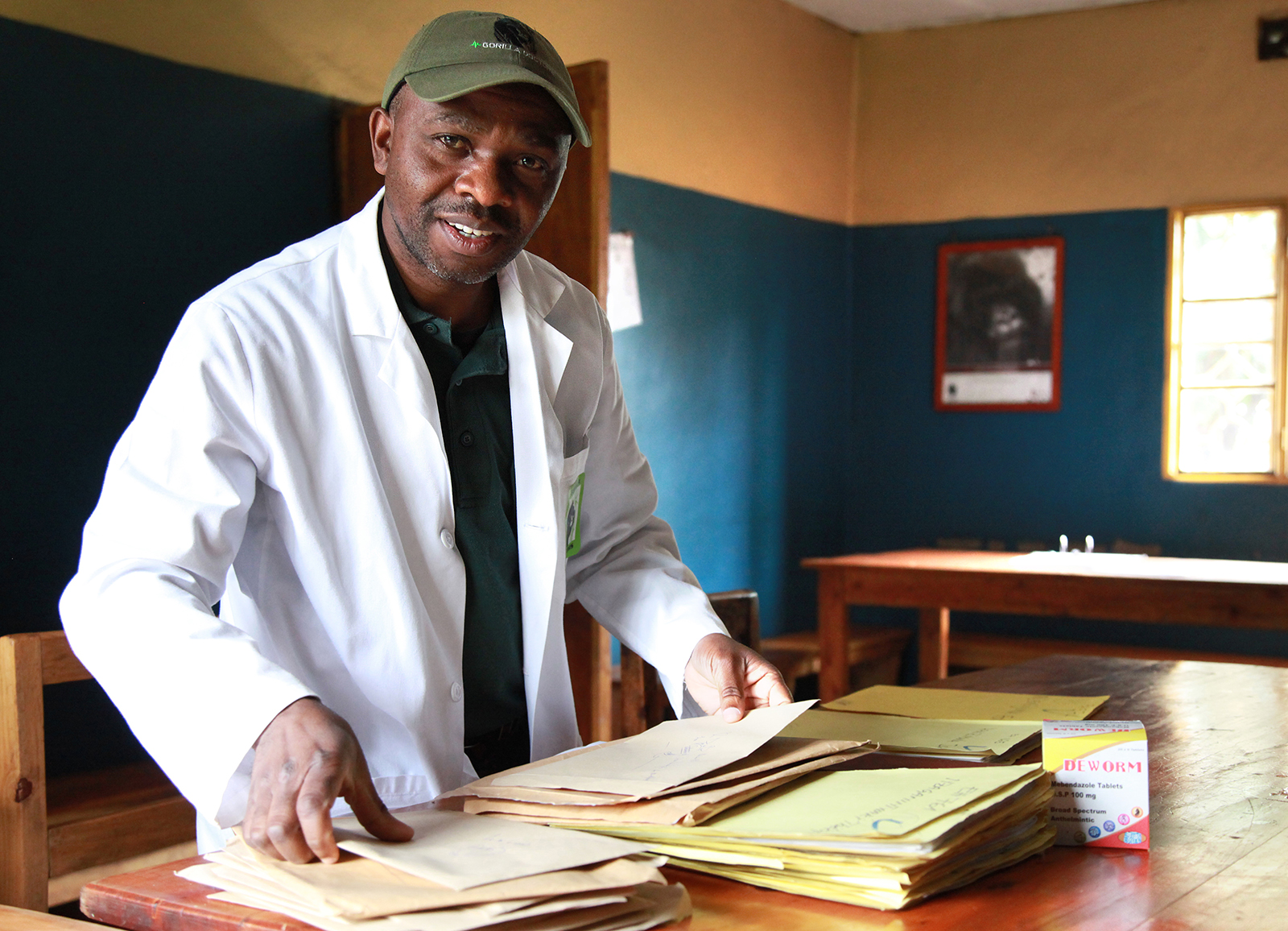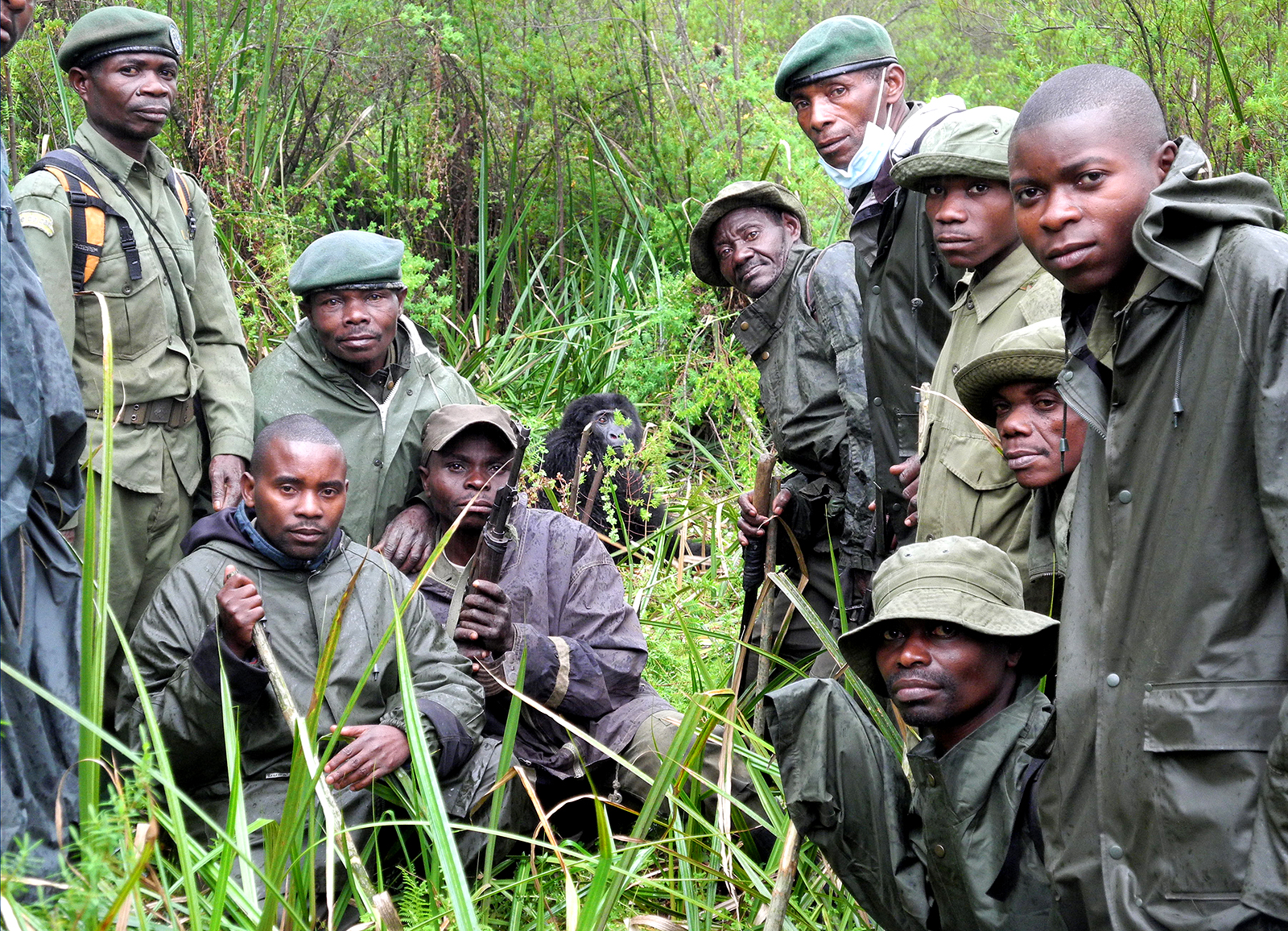One Health Medicine
We approach gorilla medicine from a “one health” perspective—a belief that the health of one species is inextricably linked to that of its entire ecosystem, including humans and other animal species.
Research studies show that gorillas can become ill and even die as a result of coming into contact with germs transmitted by people and other animals. The relationship is dynamic, given the movements of people and animals in and out of the national parks, creating countless opportunities for disease exchange. Conservation workers and tourists spend time with habituated gorilla groups on a daily basis. Gorillas can also venture outside the national parks, coming into contact with local people and their domestic animals. Gorilla Doctors cannot ensure the long-term health of mountain gorillas without addressing human and domestic animal health as well.

The land surrounding mountain and Grauer’s gorilla habitat is some of the most densely populated in Africa, with most people farming for their livelihoods. Pictured here, fields cultivated by members of the community press against the boundary of Rwanda’s Volcanoes National Park.
One Health Medicine
Gorilla Doctors first began developing human and domestic animal health projects in the late 1990s. Gorilla Doctors constantly looks for ways to strengthen its ongoing One Health-oriented programs and develop new approaches for conserving gorillas through new initiatives, which to date include:
Facilitating annual health screenings, follow up care, and health education for people who work in the national parks through our Gorilla Conservation Employee Health Program.
Providing rabies vaccines for dogs and cats living near gorilla habitat and educating their owners about best pet care practices.
Conducting pathological examinations of tissues collected during post mortem exams of deceased gorillas and other wildlife with which gorillas share the forest to determine the cause of death.
Surveying live wildlife for pathogens that could be risky for people and gorillas through the PREDICT project.
Conducting research to investigate the links between the health of gorillas, humans, and other animals.
Making recommendations to government and local authorities about best practices for managing a healthy gorilla population based on research findings.
Providing African professionals and students working in the area of veterinary science and wildlife conservation with opportunities for training and research.
Connecting veterinary, medical, public health, and PhD students from UC Davis and other universities with volunteer and research opportunities in Africa with Gorilla Doctors and its partner organizations.
Did You Know?
When time and resources permit, the Gorilla Doctors also consult on livestock and pet health issues in the region. In 2009, Gorilla Doctors helped a citizen in Rwanda establish a business producing alternative fuel briquettes composed of recycled materials as a way to combat deforestation. While that business is now independent, we continue to support the project as one of her best customers.
Employee Health Program
To reduce the risk of disease transmission between people and gorillas, Gorilla Doctors facilitates annual health screenings and follow-up care for those people who come in contact with the gorillas the most—the people who work tirelessly in the national parks to protect the gorillas. Each year, hundreds of rangers, trackers, researchers, and others who work in the parks participate in our Employee Health Program. We currently offer this program for people working in Volcanoes National Park, Rwanda; Virunga and Kahuzi-Biega National Parks in DRC; and for the staff of the Institute of Tropical Forest Conservation working in Bwindi Impenetrable National Park. Thanks to the EHP, many of these conservation employees have access to care that would otherwise be too expensive or too difficult to obtain otherwise. Gorilla Doctors’ EHP Manager, Jean Paul Lukusa administers this program in conjunction with local hospitals, which provide the necessary facilities and medical staff.

Gorilla Doctors Employee Health Program manager Jean Paul Lukusa prepares to deliver results from tracker’s health exams.
Through this program, conservation employees:
Undergo annual physical exams including screening for intestinal parasites and diseases like TB and HIV;
Are immunized for deadly diseases such the measles and polio, as needed;
Receive treatment or referrals for additional care if they are sick;
Link to government programs that provide treatment for chronic diseases, e.g. antiretroviral drugs if they are HIV positive;
Get fitted with eyeglasses if they have vision problems;
Participate in health education programs; and
Bring their spouses and children to receive treatment for intestinal parasites and counseling about hygiene, family planning, and HIV prevention on a quarterly basis.
Did You Know?
Nearly 400 national park workers participate in the full health screening program and more than 2,000 family members are able to take advantage our de-worming and health education programs.

Rabies Program
Gorilla Doctors views rabies in dogs as a threat to the gorillas and other wildlife because domestic dogs frequently enter the park. Most domestic dogs in the area are kept for protection or hunting and not as pets. Dogs tend to be kept outside at night and are expected to scavenge for themselves, so these animals sometimes enter the national park in search of food and water. Some dogs are also used by poachers to illegally hunt wildlife inside the park. The Gorilla Doctors regularly find dog footprints inside the park, and on several occasions have recovered the bodies of golden monkeys that appeared to have been killed by dogs. If one of these dogs were rabid, it could easily pass this lethal viral disease to wildlife, including gorillas, not to mention people.
Since 2006, Gorilla Doctors has worked with the Rwanda Agricultural Board to vaccinate more than 1,000 domestic dogs and cats living around Volcanoes National Park. Prior to our program, very few dogs and cats in this area were vaccinated because most owners could not afford the $5 to $10 vaccine.
Gorilla Doctors’ rabies program is designed to prevent rabies outbreaks through regular vaccinations and community education. Dr. Noel, the rabies program manager, trains local veterinarians to administer rabies vaccines and counsel their clients about proper care for their animals. The veterinarians visit clients individually throughout the year and also host rabies clinics at central locations. The clients’ dogs and cats receive their rabies vaccines for free, thanks to supplies donated by the Gorilla Doctors.

UC Davis medical residents work in Ruhengeri Hospital in Rwanda.
UC Davis Medical Resident Program
As part of our efforts to improve human health in the communities surrounding gorilla habitat, third-year medical residents from UC Davis travel to Rwanda and volunteer their skills at Ruhengeri Hospital, which is located down the street from the Gorilla Doctors’ regional headquarters in Musanze. Ruhengeri Hospital is the only hospital serving the one million people who live in the region, receiving patients referred from local health clinics in communities surrounding Volcanoes National Park.
The residents participate in grand rounds with the hospital’s physicians, care for patients in the hospital’s intensive care and other units, and conduct informal training sessions with the hospital’s faculty and nursing staff. In turn, the residents gain invaluable firsthand experience with practicing medicine in a country with limited resources. Dr. Tonya Fancher and Dr. Craig Keenan, professors at the UC Davis Medical Center, oversee the Gorilla Doctors’ resident program.


 Donate
Donate